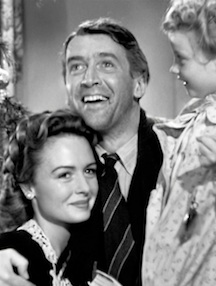By Victoria Dolloff
In the spirit of the season, The Key Reporter has a trivia question to share with your family and friends around the holiday table:
Q: Which Christmas film classic mentions Phi Beta Kappa?
A: With its themes of small town charity, Christmas spirit, and familial sacrifice, the answer is the 1940s classic, It’s A Wonderful Life.
It’s a Wonderful Life is a 1946 film from award-winning director Frank Capra, adapted from the book The Greatest Gift by Philip Van Doren Stern. Despite having limited success at the box office when it was first released, it has grown to become one of America’s most beloved holiday movies.
It is interesting to note that despite becoming a Christmas classic, It’s a Wonderful Life was not intended to be solely a holiday film. Although a large part of the movie takes place on Christmas Eve, the film explores broader American themes, exposing the tribulations of the American dream.
The film takes place in the small town of Bedford Falls, New York. George Bailey, played by James Stewart, contemplates suicide when he faces personal and financial ruin. George is haunted by the reality that he is “worth more dead than alive” and teeters on the edge of a bridge. Answering prayers to heaven, guardian angel Clarence Odbody comes down from heaven to Bedford Falls to show George the true value of his life. With Clarence in tow, George travels around the town seeing how different Bedford Falls would be if he had never been born.
Throughout his life George had always wanted to leave his small town and travel the world. Instead, George takes on the burdens of his family, managing the ‘Building and Loan’ after his father’s sudden death, using his own money to help clients when there was a threat of a national financial collapse, and if not most importantly saving his brother in an accident when they were kids. George’s life had been one of personal sacrifice.
Without his presence, those around him would have had dismal outcomes: George’s mother would become a cantankerous innkeeper; his uncle, institutionalized; his wife Mary became an “old maid”; and his younger brother, marked by a gravestone. Their possible lives without George stood in stark contrast to their lives with his presence.
Most affected was George’s younger brother Harry Bailey. Due to George’s sacrifices for him, Harry leads a full life. As described, George saves Harry after a sledding accident. He also gives his savings to Harry to go to college and allows Harry to take another job despite original plans to share in the Building and Loan. To George, Harry represents a successful life. Harry is experienced, well educated, and eventually becomes a war hero.
When Harry steps off the train from college, George exclaims, “There’s the professor now! Old professor, Phi Beta Kappa Bailey! All American!”
Other than being a fun piece of trivia for dinner guests, this reference to Phi Beta Kappa reveals values seen and understood about the organization. Like George sees in Harry, Phi Beta Kappa represents commitment to education as well as the pinnacle of success. The words “Phi Beta Kappa” have become over the years a widely-recognized expression for excellence, used to indicate high achievement, success, and intelligence in various fields.
This form of popular usage is a compliment to the prestige of the organization and its continuing viability in American popular culture and media.
Victoria Dolloff is a senior at Fairfield University majoring in studio art. Fairfield University is home to the Zeta of Connecticut chapter of Phi Beta Kappa.




